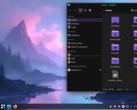Lenovo is preparing official Linux support for its handheld gaming devices with a new WMI driver set to debut in Linux kernel version 6.17. Submitted by developer Derek Clark, the patch introduces a platform driver for Legion handhelds such as the Legion Go S, offering native access to power profiles and hardware-level toggles.
The update marks a notable shift for Linux users on AMD-based handhelds. Once merged, it will allow gamers to switch between performance modes and energy-saving settings directly through the Linux sysfs interface, without relying on Windows-specific software like Armoury Crate or external scripts.
The Legion WMI driver follows a similar pattern to Asus' approach with its ROG Ally series but is tailored specifically for Lenovo's embedded controller. It offers kernel-level hooks for managing thermal policies and performance curves, which can be particularly useful for developers and Linux-based platforms such as SteamOS.
A community guide on GitHub aimed at Legion Go users underlines the practical need for such support: "TDP on the Legion Go must be set via Lenovo's WMI methods, which currently aren't accessible without acpi_call on Linux. There is a work in progress driver for the LGO, but it is not ready yet." That status is now changing, as the newly queued patch introduces standardised access to key functions via the mainline kernel.
In a separate patch, Clark also added support for the Legion Go S controller's HID interface. This enables firmware-level communication and could improve compatibility with tools like fwupd, potentially streamlining future updates.
The driver is expected to be included in the platform-drivers-x86 tree and rolled out with Linux 6.17, opening new doors for handheld Linux gaming.















